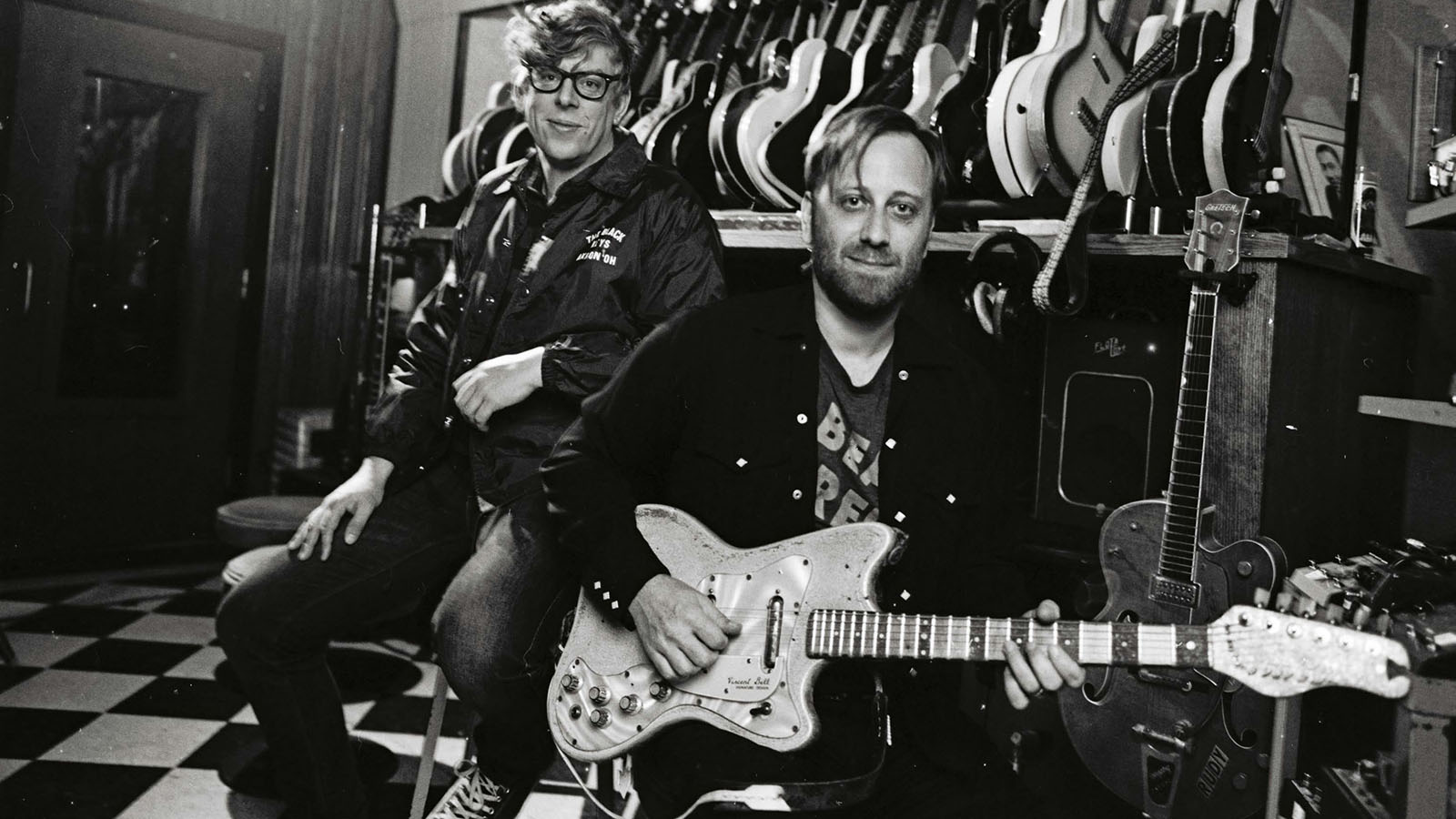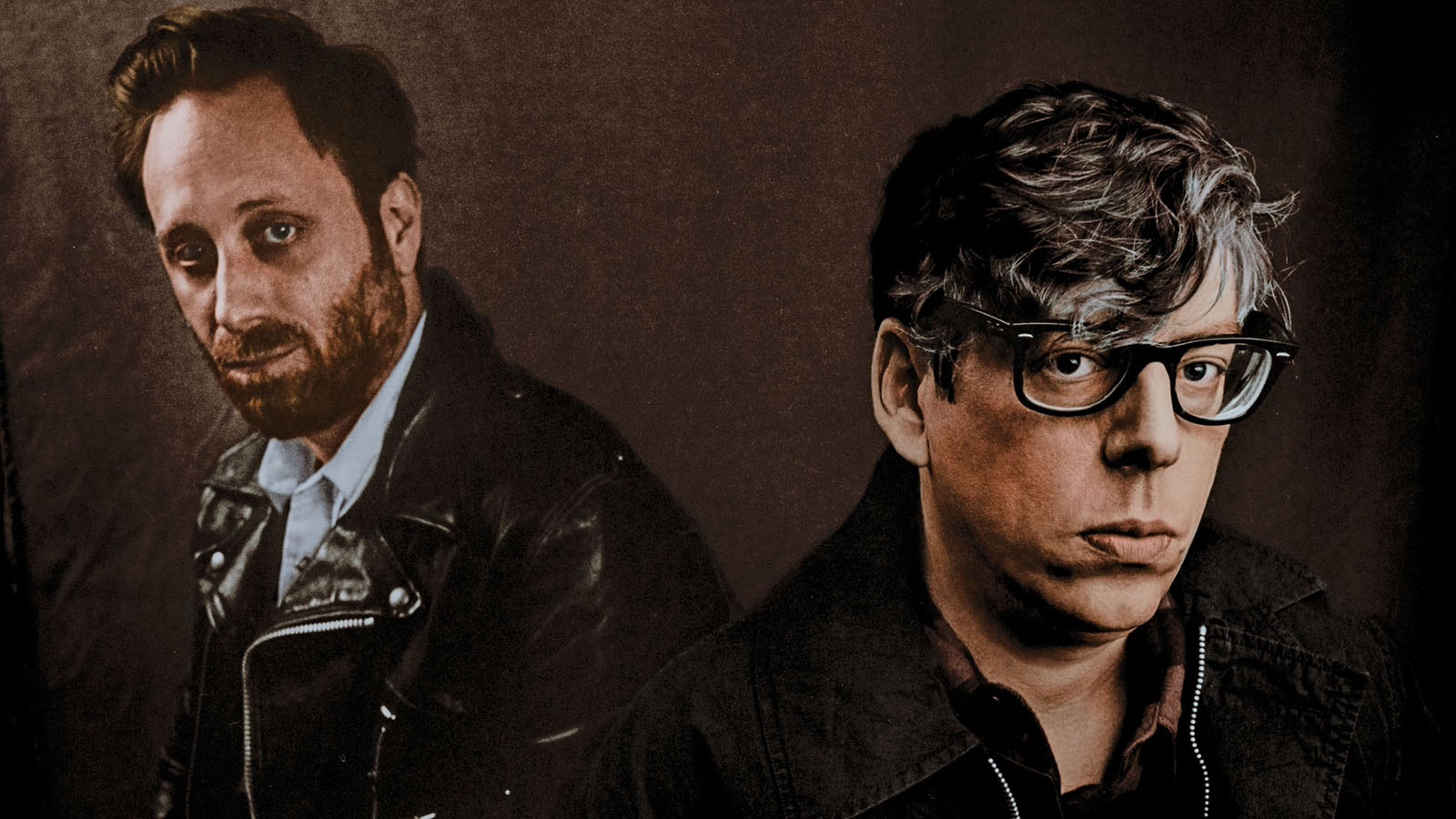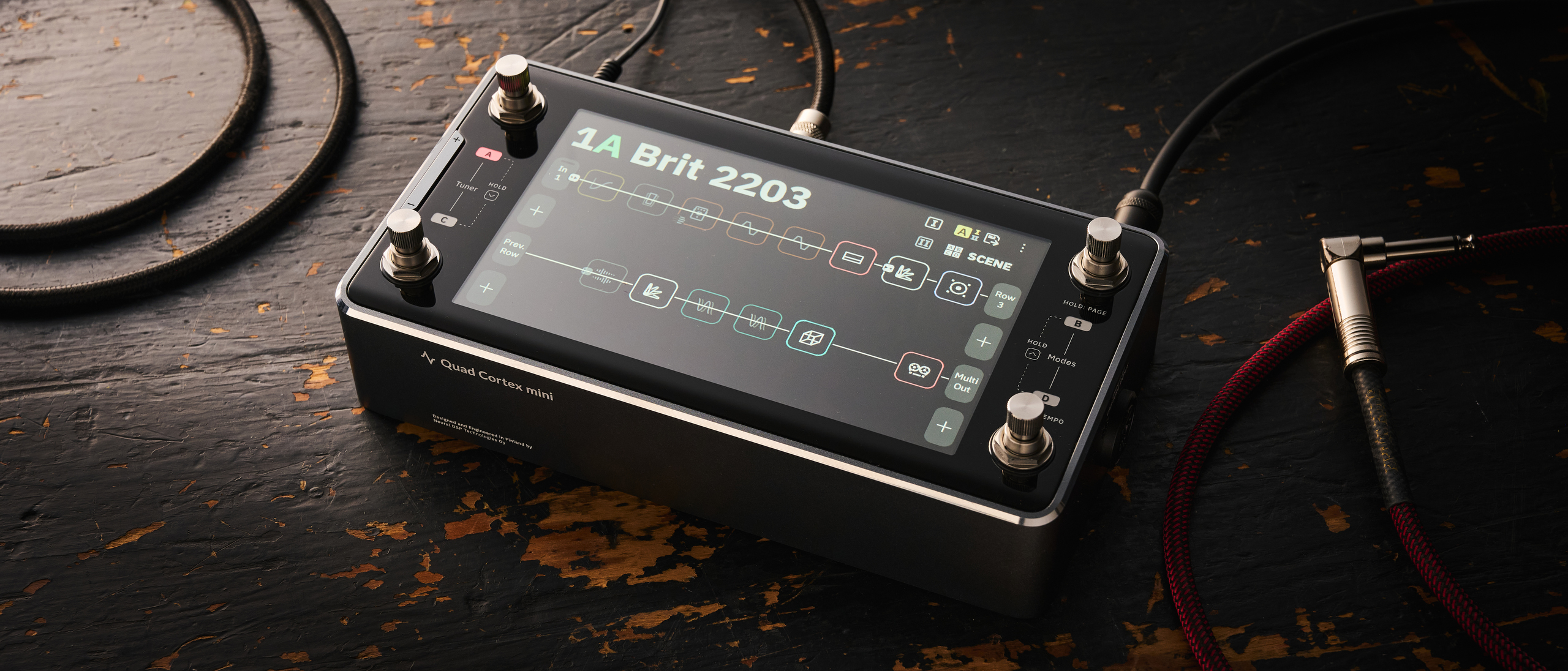The Black Keys' Dan Auerbach reveals what made him "fall in love with the electric guitar all over again" in GW's in-depth interview
The pawn-shop electric revivalist breaks down the six-string-driven approach on Let's Rock

All the latest guitar news, interviews, lessons, reviews, deals and more, direct to your inbox!
You are now subscribed
Your newsletter sign-up was successful
When The Black Keys released Let’s Rock earlier this year, it represented the first new music from singer and guitarist Dan Auerbach and drummer Patrick Carney in five years. But to hear Auerbach tell it, when they entered his own Easy Eye Sound in Nashville to get to work on the record, their ninth full-length since 2002, it was as if no time had passed at all.
“We just started playing music and this is what came out,” he explains simply.
In conversation, Auerbach can occasionally be a man of few words, but in this case he’s hardly being dismissive or evasive. In truth, he and Carney did, for all intents, enter the studio and just, well, rocked, pulling together 12 tunes from absolutely zero previously created material - and producing the entire affair themselves.
It’s an unusual way for a multi-platinum act to work in this day and age, but, in Auerbach’s mind, it makes perfect sense for the duo.
“When you’ve been in a band with somebody for 18 years, we don’t even have to talk about things - we just do it,” he says.
In some respects, what the pair achieved on Let’s Rock recalls the more bare-bones riff ’n’ rhythm sound of early Black Keys records like their 2002 debut The Big Come Up and 2003’s Thickfreakness.
Pat and I have this special relationship where when we get together it just sounds like the Black Keys. We don’t even have to try
The album’s 12 tracks are short, focused, hooky and unequivocally guitar-centric, from the crushing power-chord hooks of opener Shine a Little Light to the gnarled boogie of Eagle Birds, the slow-burning soul of Walk Across the Water to the overdriven guitar scuzz of Every Little Thing.
All the latest guitar news, interviews, lessons, reviews, deals and more, direct to your inbox!
At the same time, similar to more recent Keys records, there’s also expanded instrumentation (most significantly, Auerbach adding bass behind his guitar parts) and less of a strict adherence to traditional blues forms.
The result is one of the duo’s most overall satisfying records. And if, after half a decade apart (during which time both members stayed plenty busy, writing, recording and producing with others), it sounds as if Auerbach and Carney haven’t lost a step, well, there’s a reason for that.
“Pat and I have this special relationship where when we get together it just sounds like the Black Keys,” Auerbach says. “We don’t even have to try.”
Auerbach recently phoned Guitar World from Easy Eye Sound - where he “lives” - to talk about the making of Let’s Rock.
In the following conversation, he discusses the gear he used on the record, the unexpected guitarist who helped to inspire the sound and direction of the new music, and his and Carney’s unique creative process in the studio, which, in this instance, saw them write and record in a quick, spontaneous manner.
And the secret to their musical partnership?
“The thing that really fucks up any band, really stifles creativity, is being insecure and not being able to self-edit - not being able to work around certain criticisms,” Auerbach says.
“That’s always the thing that’s crippling. If you can’t get over that, you can’t make music. But Pat and I are just so beyond that.”
It’s been five years since the last Black Keys album; at what point did you make the decision that it was time to get back in the studio together?
I really didn’t realize how much Glenn Schwartz had influenced me until I did that session. It just hit me like a ton of bricks
"Well, about a year-and-a-half-ago I made a record with this guy named Glenn Schwartz, who was from northeastern Ohio and who was the original guitarist in the James Gang.
"He was Joe Walsh’s guitar hero. Joe said the first time he saw Glenn Schwartz was in 1966 or 1967 and he was wearing, like, purple velvet bell bottoms and no shirt and playing an Epiphone Casino up on somebody’s shoulders in a bar. [Schwartz, who passed away in November 2018 at age 78, was eventually replaced by Walsh in the band.]
"Back when I was 17, 18, 19 years old, Glenn would still play at this bar in Cleveland every Thursday night, and I would go to see him. Even then he was old, but he still rocked like crazy.
"So I decided to invite Glenn to my studio in Nashville and make a record with him. I invited Joe [Walsh] out too, and we played all of Glenn’s old songs. And just watching him play those songs reminded me of all of the licks that I borrowed from him when I was first making Black Keys records.
"It put me right back in that place and made me fall in love with the electric guitar all over again. I felt the same way I did when I used to watch him when I was 18. I really didn’t realize how much he had influenced me until I did that session. It just hit me like a ton of bricks. And right when I was done with that session, we put the Black Keys on the books.

Let’s Rock is a more straightforward and in-your-face guitar record than the previous Black Keys album, 2014’s Turn Blue. Was that partly a result of your having been reintroduced to Glenn’s playing?
"Yeah. That’s definitely where my head was at. And you know, when Pat and I got back together, we never talked about inviting anyone else to come and play or to co-produce. I just sat down at the guitar and Pat sat down at the drums and that was it. We started playing and we didn’t really change the formula at all for the whole record."
This time you also went into the studio without having worked out any material beforehand.
"Everything was improvised. We would just sit down and start playing, figuring out what we liked and getting away from what we didn’t like. We were following the songs, just trying to find something that felt good. We would compose instrumentals, with intros and verses and turnarounds and, you know, maybe a bridge here or a solo there or an outro here.
"We’d figure all that shit out and then cut it like that and try to get it within the second or third take. So every single song has that live performance at the foundation of it. And then after we got the take, that’s when I’d go in and start working on vocals and try to find melodies. It was like writing in reverse, almost."
How long did it take before you stumbled onto something that was album-worthy?
"Actually, the very first idea that we had is on the record. It turned into the song Breaking Down. That was the very first time we sat down to play together in however many years, and just immediately we were making music."
In that environment, how does that actual creative process proceed? Are you playing off of what Patrick might do rhythmically, or is he responding to a riff or chord progression on the guitar?
"It’s both. There are no rules. We just go by feel, because we’ve worked together for so long now. So we’re able to work really fast. It was right into it. We had no pre-production meeting, we had no talk of what we were looking to do. We didn’t really listen to much music in the control room or anything to get inspired."
Did you approach your solos in the same sort of spontaneous manner?
More than half of the solos on the record are the improvised takes from the original foundation tracks. I just fucking kept ‘em
"Yeah. More than half of the solos on the record are the improvised takes from the original foundation tracks. I just fucking kept ‘em."
For many artists, the studio is the place you go after you’ve spent weeks or months or even years writing and demoing and rehearsing and doing preproduction and so on. It’s a means for getting your finished idea down on tape, so to speak, but what’s interesting about you is that you seem to view the studio as a creative tool in and of itself.
"Well, this is the thing: I live in the studio. I’m here every day, whether I’m doing a Black Keys record or not. So I’m used to working in here. My work is creative and it’s different every day and it’s exciting. Because of that I think my perspective is just different."
What about when you’re playing live? Is that same spontaneity and ability to improvise that you have in the studio also present onstage?
"Not really. I think the thing about the Black Keys is we started as a studio band. We really love being in the studio and making sounds and recording. Being on the stage was never the thing that was so near and dear to us. So making that transition from the studio to the stage, even with as long as we’ve been playing, it’s still slow. [Laughs]
"It’s like a different experience. We don’t really improv onstage. We have a couple of spots where we can do a little this or that, but it’s not a lot of improv. Instead of making music, we’re performing."
Let’s talk about some of the gear you used on the new record. What were your preferred guitars and amps?
"A guitar that I used a whole bunch was a 1964 Guild Starfire III, with those Guild mini-humbuckers and the Guild label Bigsby. And there was a Gretsch Chet Atkins named Rudy. I’ve kind of fallen in love with that guitar. I used those two a lot.
My electric sitar actually belonged to [session guitarist] Vinnie Bell. It was used on movie soundtracks and a bunch of hits from the '60s, '70s and '80s
"I also used my Ibanez SG 'lawsuit' guitar quite a bit, and my Vinnie Bell electric sitar, which actually belonged to [session guitarist] Vinnie Bell. It was used on movie soundtracks and a bunch of hits from the '60s, '70s and '80s. You can hear it on the new record on the intro and turnarounds on Breaking Down.
"Then there was a Gibson Everly Brothers acoustic and also my Teisco Del Rey four-pickup guitar that used to belong to Hound Dog Taylor. I used that to double up some of the rhythms on some of the tracks I did with the Guild.
"As far as amplifiers, I’ve got a little Flot-A-Tone that I used quite a bit, and a little tweed Deluxe copy, made by a friend of mine in Cleveland named Nick Miller. And sometimes if I needed some choppy tremolo I used a silverface Deluxe Reverb. But that’s pretty much it."
How about effects?
"I had a few fuzzes - my Marshall Supa Fuzz and my Ibanez Standard Fuzz. The Ibanez is from the late-'60s, and I’ve been using it since the first Black Keys record.
"I also had an old Prescription Electronics Face Lift. It has a fuzz channel and an octave channel but I only used the octave channel. And I used a Uni-Vibe a little bit, and also a [Catalinbread] Belle Epoch delay."
Your rhythm tones are so distinct from song to song, and in many cases - Shine a Little Light and Eagle Birds from the new album would be examples - the sound itself is arguably as central to the character of the song as the riff or chord progression you’re playing. Does a tone or an effect ever guide a song during the creative process, or do the sounds come later on?
When you find that little sweet spot where the guitar’s really kind of singing… that’s the fun of it. Especially when it’s just a two-piece, because you get those little ghost notes
"Oh, no - that’s all during. When you find that little sweet spot where the guitar’s really kind of singing… that’s the fun of it. Especially when it’s just a two-piece, because you get those little ghost notes and things. Makes it a little bouncier somehow. I think playing into the right effect is kind of important to creativity."
Can you give any examples of songs where that happened on this record?
"Well, like you said, Eagle Birds is one. That one started with that kind of, basically, T-Model Ford guitar rhythm. He’s one of my guitar heroes, and so I just started playing a rhythm in that style.
"I think I had a single-transistor fuzz going, or maybe some sort of treble booster. Because I really do love treble booster, especially into the right tube amp; it’s just so sweet. So it was all about having the right sound, and being able to touch the strings real light, but have the tone be explosive.
"And then Every Little Thing, the intro to that was me playing the Guild through, it might have been the Face Lift pedal. And that’s a good sound.
"So in general I was trying to get sounds that I hadn’t gotten before. That’s why I switched out guitars a lot and went for some different combinations. Using the right Gretsch with the right amp with the right spring reverb, it’s just like, 'Goddamn!'
Over the course of your 18 years with the Black Keys has your approach to guitar tone changed significantly? Do you feel you’re looking for something different now than you were years ago?
"I think that ultimately I’m always going for kind of the same thing I like and that I’ve always liked. And that’s what was so amazing to me about seeing Glenn Schwartz again. It was him just fucking blowing my mind all over by doing the same exact thing he’d always done. [Laughs] I’ve always been such a sucker for that."
You like what you like…
"Yeah. And I’ve been blessed that I was able to hear people like Glenn Schwartz in person. I’ve been blessed that I was able to hear people like Link Wray in person. Because that changed me.
When you get to see a wild-ass guitarist playing through a Fender Quad Reverb run at its sweet spot – I mean, that’s crazy-sounding in a tiny bar. It can really transport you
"When you get to see a wild-ass guitarist playing through a Fender Quad Reverb run at its sweet spot – I mean, that’s crazy-sounding in a tiny bar. It can really transport you. And for me, it did."
Now that the Black Keys are back up and running with a new album and tour, do you look forward to the next thing or do you just take it one day at a time?
"I think I take it one week at a time! I look at my weekly planner and I think about that week and I just focus on that. Because for me every week is something new.
"So the only thing I’ve been thinking right now is that me and Dan Johnson, who’s been my guitar tech since I was 17 years old, going to see Glenn Schwartz – we’ve been trying to figure out what guitars I’m going to bring on the road."
Do you tend to bring out the same guitars you used in the studio on a particular record?
Everybody thinks of my Harmony by Heath as my main guitar because it’s the one I play live. But it’s just a good touring guitar - I don’t know that I’ve ever even used it on a recording
"That’s what I’m trying to figure out if I’m going to do this time. Because I don’t know that I want to bring some of those guitars out on the road. Do I want to bring that nice-ass Gretsch and get it all beat up? I don’t know."
In addition to not wanting to damage an old guitar, vintage gear also can be temperamental and inconsistent from room to room…
"Yeah, exactly. That red guitar I tour with, that Harmony by Heath [H78]? Everybody thinks of it as my main guitar because it’s the one I play live. But it’s just a good touring guitar - I don’t know that I’ve ever even used it on a recording.
"But then I have this ‘58 Rickenbacker that’s a beauty, but I just don’t know that I want to expose it to changing temperatures and all this stuff. The thing plays so true because it gets to sit in this climate-controlled studio and just be pampered. So maybe that’s where it needs to stay. [Laughs]
"I think I’ve gotta continue to pamper some of these guitars!
Rich is the co-author of the best-selling Nöthin' But a Good Time: The Uncensored History of the '80s Hard Rock Explosion. He is also a recording and performing musician, and a former editor of Guitar World magazine and executive editor of Guitar Aficionado magazine. He has authored several additional books, among them Kurt Cobain: Montage of Heck, the companion to the documentary of the same name.

